The Darwin Awards Countdown to Extinction (16 page)
Read The Darwin Awards Countdown to Extinction Online
Authors: Wendy Northcutt
Reader Comments
“Do we
really
need suppository instructions?”
really
need suppository instructions?”
“I used to think people had
some
brains.”
some
brains.”
“. . . and they say a pharmacy is dull?”
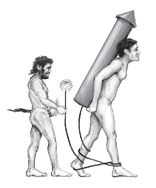
SCIENCE INTERLUDE SEX ON THE BRAIN
By Robert Adler
Suppose our big brains didn’t evolve for practical reasons such as better hunting, gathering, or fighting—things that our less-endowed primate cousins do quite well. What if the explosive growth in brain power that made us what we are today had nothing to do with fitness, but everything to do with sex?
That ’s what evolutionary psychologist Geoffrey Miller thinks, and presents in convincing detail in his book,
The Mating Mind: How Sexual Choice Shaped the Evolution of Human Nature. (New York: Vintage, 2001)
The Mating Mind: How Sexual Choice Shaped the Evolution of Human Nature. (New York: Vintage, 2001)
What counted wasn’t the ability to pitch a spear more accurately, but the ability to pitch a good pickup line.
Our brains ballooned over the last two million years not to make us more fit on the savannah, but to make us more marketable in the Pleistocene equivalent of pickup bars, Miller says. Sexual selection—the individual mating choices of thousands of generations of our ancestors—is driving the growth of our big brains.
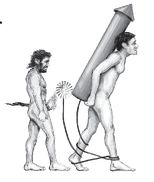
Art, Music, Language, and Creativity
Sexual selection’s fingerprints are all over a bouquet of complex and colorful human capacities, valued and attractive talents that have little to no survival value. Miller’s list includes expressive arts such as music, poetry, painting, dance, personal decoration, and universally admired qualities—such as generosity and heroism—that are tough to explain based on survival of the fittest.
“Theories of human mental evolution just weren’t accounting for (these) aspects of human behavior,” says Miller. Sexual selection, which accounts for many of the most surprising features of plants and animals, does a much better job of explaining a range of useless human talents. His ideas may even shed light on the evolutionary history that lurks behind the fatal displays of risk-taking and derring-do that garner Darwin Awards.
Survival of the Sexiest
The idea started with Darwin. In
The Descent of Man, and Selection in Relation to Sex,
Darwin argued that evolution winnows every generation through two sieves:
fitness,
which selects adaptations that help us survive; and
sexiness
(sexual selection)
,
which selects adaptations that help us mate. Fitness selection might lead to warm fur, and the ability to communicate. Sexual selection might lead to long hair and a pleasant voice.
The Descent of Man, and Selection in Relation to Sex,
Darwin argued that evolution winnows every generation through two sieves:
fitness,
which selects adaptations that help us survive; and
sexiness
(sexual selection)
,
which selects adaptations that help us mate. Fitness selection might lead to warm fur, and the ability to communicate. Sexual selection might lead to long hair and a pleasant voice.
Fitness selection has enjoyed extensive scientific scrutiny while sexual selection has been an afterthought, but current researchers are taking an avid interest in sex. After all, survival is worthless, from an evolutionary point of view, unless you manage to woo and win a mate.
Sexual selection is powered by two main engines: competition among potential suitors and individual choice of mate.
Competitive selection
—competition for mating rights—sets up an arms race that leads to aggressive, well-armed males who fight for access to females. Picture a male lion and his pride, or a stag sporting his rutting rack of antlers. While competition leads to fairly predictable outcomes, mate selection is another matter.
—competition for mating rights—sets up an arms race that leads to aggressive, well-armed males who fight for access to females. Picture a male lion and his pride, or a stag sporting his rutting rack of antlers. While competition leads to fairly predictable outcomes, mate selection is another matter.
Survival is worthless unless you manage to woo and win a mate.
Mate selection
—evolution’s wild card—is based on whatever aesthetic qualities happen to lead an individual to mate with one partner and reject another. Mate selection can home in on any feature or behavior that happens to attract and impress the opposite sex. Favorites include bright colors, rhythmic movements, and melodious voices, but there are practically as many possibilities as there are species.
—evolution’s wild card—is based on whatever aesthetic qualities happen to lead an individual to mate with one partner and reject another. Mate selection can home in on any feature or behavior that happens to attract and impress the opposite sex. Favorites include bright colors, rhythmic movements, and melodious voices, but there are practically as many possibilities as there are species.
Sexual selection
is powered by competitive selection and mate selection.
is powered by competitive selection and mate selection.
Through a hypothetical process called
runaway sexual selection,
those attractive qualities can be exaggerated to an astonishing degree. You can see it coming—the bird everyone agrees is frivolous—the peacock! Mate selection led to the insane plumage of peacocks, the meter-tall architectural nest of the bowerbird, and perhaps to many of hu manity’s most cherished creative abilities. The next time you show your moves on the dance floor, wink at the driver of that flashy sports car, or splurge on a new tattoo, thank your smart, sexy, selective ancestors—who knew there was more to life than mere survival.
runaway sexual selection,
those attractive qualities can be exaggerated to an astonishing degree. You can see it coming—the bird everyone agrees is frivolous—the peacock! Mate selection led to the insane plumage of peacocks, the meter-tall architectural nest of the bowerbird, and perhaps to many of hu manity’s most cherished creative abilities. The next time you show your moves on the dance floor, wink at the driver of that flashy sports car, or splurge on a new tattoo, thank your smart, sexy, selective ancestors—who knew there was more to life than mere survival.
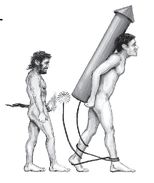
Choosy Men Choose Too
One important way in which Miller departs from Darwin is in the kind of mate selection he sees operating in the human animal. Darwin’s examples of mate selection involved flashy males showing off to attract choosy females. Miller points out that if that had been a dominant pattern in human evolution, men and women might have evolved minds as different as the plumage of peacocks and peahens.
Instead, human mental capacities seemingly evolved through mutual mate choice—our male and female forebears were
equally
attracted to smart, creative, communicative mates. Men have the reputation of being less picky than women when choosing sexual partners, but recent research has shown that that’s not the case when it comes to serious relationships that lead to children.
equally
attracted to smart, creative, communicative mates. Men have the reputation of being less picky than women when choosing sexual partners, but recent research has shown that that’s not the case when it comes to serious relationships that lead to children.
Our brains are more like entertainment centers than Swiss army knives.
Let the Big-Brained Beware
However much we value our verbal, creative, and interpersonal skills, there’s a catch. If Miller is right and our brains are more like multifunction entertainment centers than Swiss army knives, if we have been bred more to woo and win mates than simply to survive, then we may be a lot less practical and rational than we think.
Out of necessity, survival selects for realistic problem-solving minds, but sexual selection is not obliged to follow suit. It obviously favored human males who were driven to demonstrate their skills, even if that meant taking (
cough
) risks. Miller believes it also favored imaginative storytellers over plodding realists, creative dreamers and self-confident explorers over sensible worker bees.
cough
) risks. Miller believes it also favored imaginative storytellers over plodding realists, creative dreamers and self-confident explorers over sensible worker bees.
It’s encouraging to think that our minds evolved as much to dream, play, and create as to struggle to survive. “Our ancestors were more lovers than fighters,” says Miller. “That’s important for our self-concept as a species. It highlights the deep roots of love, and the attractiveness of moral virtues.”
Still, we shouldn’t be surprised if some of those playful dreamers “slide” off thousand-foot cliffs (see p. 227), do one pull-up too many on the ski-lift drive wheel (p. 51), or find other creative, dramatic and high-risk ways to take themselves and their genes over the edge and into the annals of the Darwin Awards.
REFERENCES:
Charles Darwin,
The Descent of Man, and Selection in Relation to Sex
(London: John Murray, 1871).
The Descent of Man, and Selection in Relation to Sex
(London: John Murray, 1871).
G. Gehrer and G. F. Miller, eds.,
Mating Intelligence: Sex, Relationships, and the Mind’s Reproductive System
(Mahwah, NJ: Lawrence Erlbaum, 2007).
Mating Intelligence: Sex, Relationships, and the Mind’s Reproductive System
(Mahwah, NJ: Lawrence Erlbaum, 2007).
G. F. Miller,
The Mating Mind: How Sexual Choice Shaped the Evolution of Human Nature
(New York: Vintage, 2001).
The Mating Mind: How Sexual Choice Shaped the Evolution of Human Nature
(New York: Vintage, 2001).
G. F. Miller, “Sexual selection for moral virtues,”
Quarterly Review of Biology
82(2) (2007), 97-125.
Quarterly Review of Biology
82(2) (2007), 97-125.
M. Ridley,
The Red Queen: Sex and the Evolution of Human Nature
(New York: Harper Perennial, 2003).
The Red Queen: Sex and the Evolution of Human Nature
(New York: Harper Perennial, 2003).
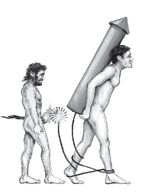
CHAPTER 6
THE FAST TRACK: TRAINS, CARS, AND BAR STOOLS!
“The Darwin Awards are always interesting. I sometimes wish that certain people would try to win one . . . You know who they are.”
—excerpt from Fan mail
Vehicular misadventure is always a winning ticket. The following tales offer variations on a theme with squished sports cars, military men gone wild, dancing drivers, insurance fraud, and the invention of a whole new type of hybrid. Hang on to your hats . . .
Motorized Bar Stool ● A One-Track Mind • Poor Decision on a Major Scale • Painkiller • Mock Death • Chutes and Spills • ICanSay/ToldYouSo • Flying Door • Clap-Clap-Clap Your Hands • Cats Land on All Fours
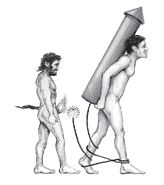
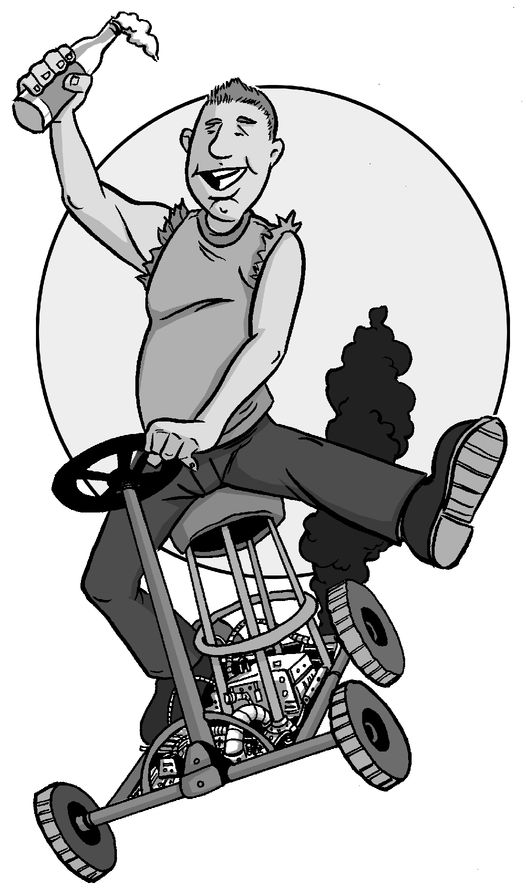
Other books
Infected (Book 2): The Flight by Cleek, Caleb
Eva and the Hidden Diary by Judi Curtin
Remainder by Tom McCarthy
The Deadly Fire by Cora Harrison
The Cherbourg Jewels by Jenni Wiltz
Sword & Citadel by Gene Wolfe
Racing to You: Racing Love, Book 1 by Robin Lovett
Katerina by Aharon Appelfeld
Get A Life by Gordimer, Nadine